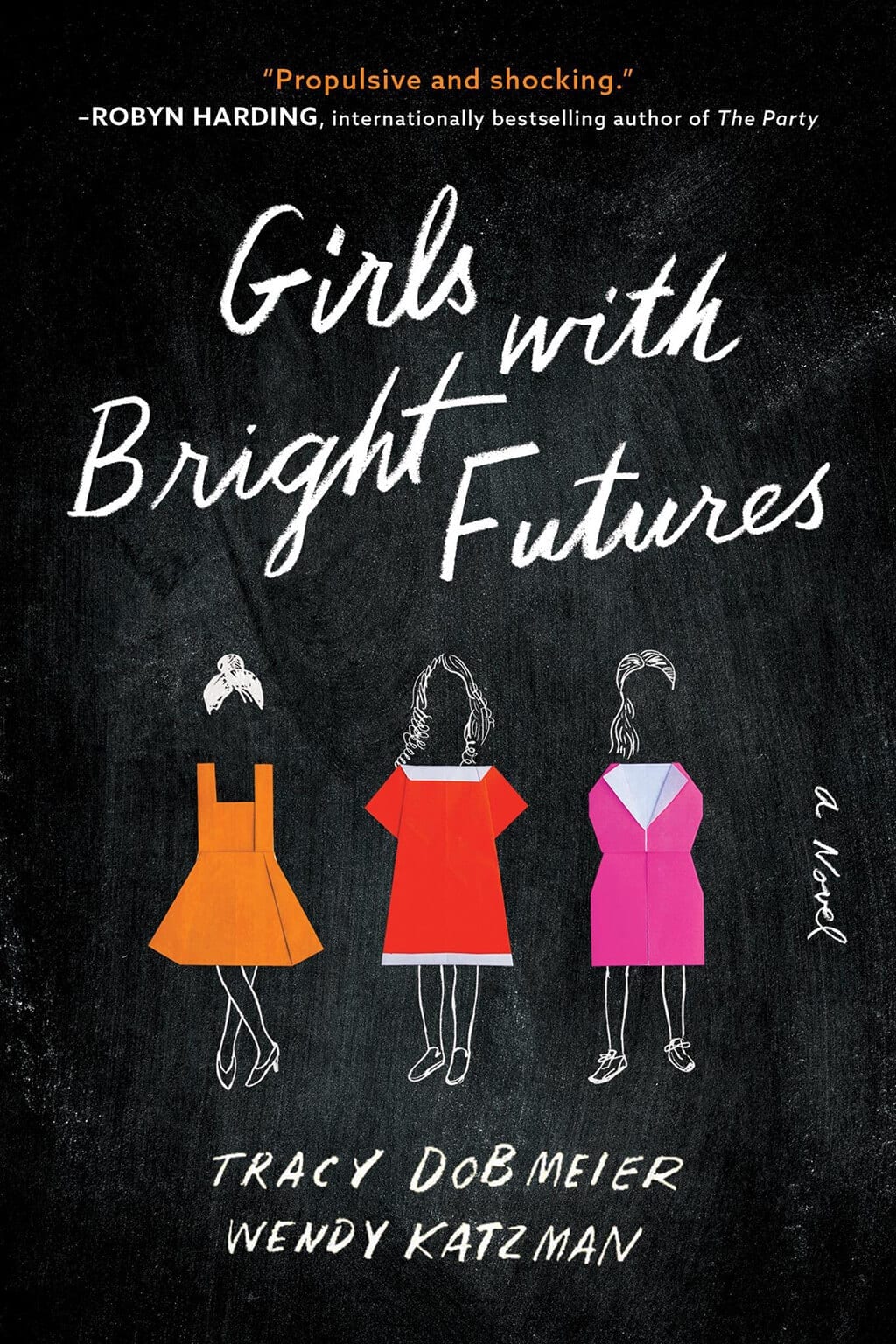We have your exclusive first look at the new novel from co-authors and real life BFFs Tracy Dobmeier and Wendy Katzman. Girls With Bright Futures is an irreverent and suspenseful novel exploring the privilege and scandal of an elite Seattle community as a group of mothers become embroiled in college admissions mayhem. Ready for the exclusive cover reveal of the book? Keep scrolling!
About Girls With Bright Futures by Tracy Dobmeier and Wendy Katzman
The perfect book club read with a suspenseful bite―when it comes to their daughters’ future, three women are about to discover if there are any lines not worth crossing…
College admissions season at Seattle’s Elliott Bay Academy is marked by glowing acceptances from top-tier institutions and students as impressive as their parents are ambitious. But when Stanford alerts the school it’s allotting only one spot to EBA for their incoming class, three mothers discover the competition is more cutthroat than they could have imagined.
Tech giant Alicia turns to her fortune and status to fight for her reluctant daughter’s place at the top. Kelly, a Stanford alum, leverages her PTA influence and insider knowledge to bulldoze the path for her high-strung daughter. And Maren makes three: single, broke, and ill-equipped to battle the elite school community aligning to bring her superstar down.
That’s when, days before applications are due, one of the girls suffers a near-fatal accident, one that doesn’t appear to be an accident at all.
As the community spirals out of control, three women will have to decide what lines they’re willing to cross to secure their daughters’ futures…and keep buried the secrets that threaten to destroy far more than just college dreams.
Get your first look at the cover of Girls With Bright Futures below!

Read an Excerpt from Girls With Bright Futures:
HOME OF MAREN AND WINNIE PRESSLEY
FRIDAY, OCTOBER 29, 11:30 P.M.
IF THE DROOL AT the corner of her mouth was any indication, Maren’s attempt to stay awake until Winnie got home from her babysitting gig was, as her daughter would say, an epic fail. Maren took in the laptop still perched on her chest, which had similarly slipped into sleep mode. With a quick tap, the web search she’d started before falling asleep flooded her retinas.
Out of sullen curiosity, she had Googled the unusual name of the professor she’d met earlier in the evening when she’d dropped by her boss’s house unannounced to deliver their tuned-up espresso machine. As the longtime personal assistant to Alicia Stone, one of the most powerful women in tech, Maren met celebrities and power players all the time. This Boston professor didn’t seem to be anyone special—likely just another pawn in Alicia’s elaborate scheme to secure admission to Stanford for her daughter Brooke. But with the early admission deadline now just three days away, he served as yet another reminder that Stanford was off-limits for Winnie just in case Maren had missed all the previous warnings.
Stretching her neck, which was stiff from dozing off at a weird angle on the couch, Maren slammed her laptop shut and jammed her hand between the couch cushions in search of her phone. The last thing she remembered was Winnie’s text saying she was heading home, but when she fished out the phone and unlocked the screen, Maren saw it was already eleven thirty p.m. Winnie’s text had been over an hour ago. Had she come in already and gone to bed without saying goodnight?
Maren was just about to check Winnie’s bedroom when the doorbell rang, followed by insistent knocking—and suddenly Maren realized it was the sound of the doorbell that had jarred her awake in the first place. With a smile playing at the corners of her mouth, Maren pictured Winnie’s on the doorstep, keyless once again. For such a smart kid, her daughter was ridiculously forgetful. As Maren strode the few steps to the door of their tiny bungalow, she called out, “OK, OK! Coming!” She turned the doorknob and prepared to greet Winnie with a classic motherly look that said, “I’m happy you’re home safe, but what the heck?”
But her wry grin faded the instant she threw open the door. It wasn’t her daughter; not even close. At the sight of the uniformed police officer standing under the dim, dead- bug-filled porch light, Maren instinctively closed the bulky cardigan she was wearing over her threadbare pajamas. “Hi, Officer. Can I help you?” Despite having been raised to believe the police were the world’s best helpers, Maren’s only real interaction with the police years ago had left her with an altogether different impression.
“Good evening, ma’am. I’m Officer Wilson. Are you Mrs. Pressley?”
How did he know her name? Maren’s nervous system switched into high alert. “Yes?”
“Is Rowan Pressley your daughter?”
No one ever called Winnie by her full name. “Yes,” she said with a growing sense of dread.
“Ma’am, I’m sorry to tell you this, but your daughter was in a serious accident.”
“No,” Maren said, shaking her head. “Are you sure you have the right person?” She wanted to slam the door shut and disappear back into her nap or her confusion or even her bitterness toward Alicia. Anywhere but here.
“Ma’am, is this your daughter’s cell phone?” Officer Wilson held out an iPhone with a familiar pink case. It looked silly in his large palm, and Maren almost said so, like if she could muster a wisecrack, that would some-how prove the phone wasn’t Winnie’s. As if in slow motion, Maren saw her hand reaching for the phone. The glass was badly cracked. She turned it over, hoping against hope not to find the most obvious identifier, the unique PopSocket designed to look like a salmon sushi roll that Winnie had splurged on with some of her babysitting money. Fear surged through Maren. “Oh my God…is she OK?”
“As I said, she’s been in a serious accident. On an electric scooter,” Officer Wilson said. “She’s been taken to Memorial Hospital. I’m sorry, but I don’t have any information on her condition.”
“But she’s alive, right?”
“They didn’t share any details with me. I was only asked to notify her parents and bring them to the hospital.” Officer Wilson shifted his weight and appeared to peek over Maren’s shoulder into the house. “Is Winnie’s father home?”
“No. It’s just me. Just the two of us.”
He nodded. “You’re going to want to follow me to Memorial now, ma’am.”
Maren was frozen in place.
“Ma’am?”
“Yes, OK. Just give me one minute.” As she closed the door and turned to change out of her pajamas, a black cloud of panic engulfed her. She leaned back against the door and squeezed her eyes shut for a moment, willing her vision to clear and her legs to stop shaking. With one hand steadying her against the wall, she took a few steps toward her bedroom but was stopped cold by the photos lining the hall. Though she passed these pictures every day, she only rarely registered them. Now she couldn’t tear her eyes away. Winnie’s goofy grin on her fifth birthday showing off the gap where her bottom two baby teeth had once resided. Winnie and Brooke as ten-year-olds in matching Stanford T-shirts with their arms wrapped tightly around each other on the beach in front of the Stones’ San Juan Island cabin. Back when they were still best friends. Last year’s junior prom, with Winnie three inches taller in heels than her normal five feet seven inches, wearing a soft blue dress that highlighted her natural beauty without flaunting it. And the most recent picture on the wall—of Winnie’s induction into the National Honor Society just last month—in which she was almost the exact age Maren had been when her life changed forever. Maren remembered thinking as she snapped that photo that all she wanted was to preserve her daughter’s happiness and keep her safe. Winnie was all she had. She cast a tearful glance upward and begged an omniscient being she’d long since given up on: Please, please, please, let her be OK.
Maren followed the flashing lights of Officer Wilson’s squad car in front of her as they wound their way down the side streets of her modest neighborhood, one of the few left in Seattle’s tech boom landscape, and onto the arterial that would deliver them to Memorial Hospital. She tried to focus on keeping the appropriate space cushion between their cars, but her mind refused to cooperate, and she shivered uncontrollably as her fears bombarded her one after the other. What if Winnie died before she got there and she never got to say goodbye? What if she was paralyzed or brain-dead? And though she knew this was the least of her worries, how would she ever manage the astronomical medical bills no matter what happened to Winnie?
Despite working for Alicia for more than ten years and outlasting every other household employee, health insurance had never been part of the deal. Maren had looked into getting them covered this past year, but even the subsidized rates available on the state healthcare exchange had seemed too daunting. She’d gambled on their good health and diverted the money to replace her car’s transmission instead, knowing that they just had to get Winnie to college, where at least Winnie would then be covered by a more affordable university plan. Would the hospital even treat Winnie? Should she text Alicia? As a member of the Memorial Hospital board, Alicia could ensure that Winnie received whatever treatment she needed. Alicia had always claimed to love Winnie like another daughter. Before all the college madness of the past few weeks, Maren wouldn’t have hesitated to ask her for help. But now Maren hoped that was a call she wouldn’t need to make.
After a sloppy parking job in the first available spot, Maren sprinted through the automatic sliding doors of the ER and approached the desk clerk, desperate for information. The clerk consulted her computer. “Your daughter’s in surgery right now. As soon as the doctors can, they’ll send someone out to update you. You can have a seat in the waiting area.”
Surgery already? “What kind of surgery?” Maren’s voice cracked. “That means she’s alive, right?”
“I’m sorry, but I don’t have any more information. A doctor should be out soon,” the clerk said. “Oh, wait. Mrs. Pressley? It looks like we don’t have your daughter’s insurance information in the computer. Do you have that with you?”
“Uh no, I don’t. I left my house so fast.” Maren made a show of patting her pockets. “That won’t affect her care, right?”
“No, but I’ll need that information when you have a chance.”
“Yes, of course,” Maren said. “I’ll take care of that as soon as I can.” It wasn’t exactly a lie, even if it was more aspirational statement than concrete plan.
Maren scanned the waiting area. There was a young family with three children running wild, a disheveled bearded man who was either homeless or hipster, and a woman sitting across the room wearing a black puffy coat and a baseball cap. Maren found a solitary seat, far away from the others, with a clear view of the “Unauthorized Entry” doors, and proceeded to wait.
A half hour passed, and Maren again pleaded with the desk clerk for information, studying her facial expression for any sign at all that Winnie would be OK. But there was still no word from the surgeon, and neither the clerk’s words nor her body language revealed anything. As she wandered back to her seat, Maren noted that the young family and homeless/hipster guy had been replaced by new anxious faces, but the woman on the far side of the room continued her own lonely vigil. Maren wondered what her story was. Who was she waiting for? Maren had the feeling the woman was sizing her up too. She tried to take comfort that she was not completely alone with her worry, but it was no use. She sat down and dropped her head into her hands.
There was simply no way a chance accident on a stupid neon electric scooter could mark the end of their story. Winnie’s life had begun as the ultimate heartbreak for Maren. But over time, with Winnie’s inner light to guide her, Maren had managed to chisel away most of the ugly parts. Now all she could think about was the past three weeks. They’d argued more than they had in all the years of Winnie’s childhood combined. If the worst came to pass, how would Maren be able to live with herself, knowing one of her last acts as Winnie’s mom had been to torch her dreams? Their story was supposed to be one of triumph, with Winnie graduating first in her class from Elliott Bay Academy and heading off to Stanford, not fighting for her life inside an operating room. With the sleeve of her sweater, Maren wiped away the tears on her cheeks. Lately, she’d begun girding herself for the intense loneliness she knew she’d feel when Winnie left for college. But losing her daughter to college would be nothing compared to being swallowed whole by grief—again.
PART ONE
Maren
THREE WEEKS UNTIL STANFORD EARLY ADMISSION APPLICATION DEADLINE
MAREN PRESSLEY HAD WALKED the halls of Seattle’s Elliott Bay Academy multiple times per week for the past six-plus years, though ordinarily she did so in her role as Alicia’s personal assistant, fulfilling the multitude of volunteer commitments her boss had no intention of doing herself. In fact, Maren could probably count on two hands the number of times she’d appeared on campus simply as Winnie’s mom. Unlike most of the other EBA moms, Maren had precious little free time, and when she did manage to carve out a few minutes for herself, she was loath to spend them sticking her nose in Winnie’s academic business. Her daughter had that well under control.
But at seven this morning, Maren had received an urgent summons from the college counseling office. It was a request—or was it a demand?—for both Maren and Winnie to meet that morning with Winnie’s college counselor. EBA moms frequently speculated that the school’s seven college counselors had virtually unchecked power to sort students into elite universities. At Back to School Night, Maren had over-heard a group of parents swapping stories about dropping everything when the college counseling office called, no matter if they were titans of tech in the middle of negotiations, doctors performing routine surgery, or even, almost unbelievably, a wealthy divorcee undergoing a labia resurfacing procedure. (Being essentially invisible at EBA had its amusing perks.) So, Maren figured she owed it to Winnie to show up this morning. Checking the clock on the way into the office, she hoped that whatever the reason for the meeting, it could be dealt with quickly so she could get to work on Alicia’s massive to-do list for the day.
When Maren walked into Ms. Lawson’s office, Winnie was already there, sitting on the edge of her chair, her long blond hair pulled back in a messy bun. Maren noticed Winnie staring at the wall with longing in her eyes and followed her gaze to the array of college posters and pennants that formed a patchwork mural of leafy quads, Gothic architecture, and earnest students of all shapes, sizes, and colors. “Hi, Ms. Lawson, I’m Maren Pressley. We met last spring.” Maren shook the counselor’s hand and slid into the open seat next to Winnie.
“Right,” Ms. Lawson said with a growing smile. “I still can’t believe you’re old enough to be Winnie’s mom.” She turned to Winnie. “You’re so lucky. My mom had me when she was forty- three, and people always thought she was my grandma. So embarrassing! I mean, other than the way you two dress, you could totally be sisters.”
“If I had a nickel…” Winnie laughed.
At thirty- five, Maren was well aware she stuck out at EBA: the elite prep school version of a sore thumb. In high-income Seattle, most moms her age were still nursing babies or chasing after toddlers. Although Maren tried not to call attention to herself, the comparative youthfulness of her skin set her apart from fellow moms of EBA seniors, most of whom were a generation older. But whatever small advantage Maren gained with her natural glow, she lost a hundred times over with her glaring lack of any of Seattle’s subtle signifiers of status. Electric luxury vehicles. Athleisure clothing paired with designer handbags. Prestigious professional degrees useful for dropping into casual conversation, preferably in shorthand (“My marketing professor at Kellogg used to say…”) or, even better, in acronym (“When I went to HBS…”). Maren could hardly wait until the coming spring, when Winnie and Alicia’s daughter Brooke would graduate from EBA and Maren could watch this place recede in the rearview mirror for good.
Ms. Lawson twisted the cartilage piercing in her ear. “So hey, yeah. So…I’ve been charged with delivering some, ah, difficult and pressing news.”
Her defeatist tone struck Maren as incongruous with the we-make-your-dreams-come-true ambiance of the college counseling office. “Okay…?” Maren tucked her calloused hands under her thighs and pressed her clipped nails into the tasteful wool slacks she’d scored at Value Village last year while dropping off a gigantic load of castaways from the closets of Alicia and Brooke. Though it sometimes took every ounce of her willpower, Maren’s policy on hand-me-downs from her employer was strict—as in never ever do it, even for Winnie.
The only time she’d broken this rule was in Winnie’s ninth-grade year, soon after she’d started at EBA. Winnie had begged Maren to let her keep one of Brooke’s discards with the tags still attached— a cute, pink, and thoughtfully pre-torn sweatshirt. The very next day she’d worn it to school, but the instant she’d walked in the door after cross-country practice, she’d yanked it out of her gym bag and cut it to shreds. It was around the time Brooke had inexplicably started icing Winnie after years of close friendship. Maren had understood things were not great between them by that point, but she had never known Brooke to be vicious. Apparently, Winnie had been taken by surprise as well.
“What news, Ms. Lawson?” Winnie prompted her counselor.
As they continued waiting for Ms. Lawson while she shuffled papers and avoided their eyes, Maren kept her expression neutral and held her posture in the decorous manner that had been drilled into her by her mother in the stifling dining rooms of her childhood home and country club, perhaps the only lesson that still served her from that long-estranged relationship.
Ms. Lawson tilted her head up as though consulting a teleprompter on the ceiling. “Well, um, you see…” She pushed up her sleeve, revealing a small black butterfly tattoo on the inside of her forearm. “Four student-athletes—an EBA record actually!—have committed to Stanford. Now, I know we’ve been talking about Winnie applying early to Stanford since last year, and of course the deadline is only three weeks away. But, well, here’s the unfortunate part. We’ve been in touch with Stanford admissions and have learned they only plan to accept one additional student from EBA this year.”
“But didn’t they take seven students last year?” Winnie asked, her voice rising.
Ms. Lawson nodded. “Yes, but it turns out they’re really pushing to increase their public school yield this year, so they can’t accept as many kids from top-notch private schools like EBA as they did last year.”
“But the whole reason I moved from public school to EBA was to improve my chances of getting into Stanford.”
Before Ms. Lawson could respond, Maren jumped in. “That’s interesting information, but Winnie’s ranked first in her class and also has that first-gen hook, so what does this have to do with her?” Not only was Winnie an academic standout, but they’d also been informed by the college counseling office last spring that Winnie was blessed with an admissions “hook” of special interest to elite colleges: the first-generation college student. Maren had been pleasantly surprised by this, although it sort of felt like receiving a Nobel Prize posthumously. But apparently, she’d celebrated the victory prematurely because Maren knew exactly what this news meant for Winnie. And she suspected Winnie did too. Nevertheless, if they were going to get the shaft, Ms. Lawson at least owed them the courtesy of copping to it out loud.
Ms. Lawson squirmed in her chair. “Um, yes. Well, of course, under ordinary circumstances, as we’ve discussed, Winnie would be an excellent candidate for admission. But with the number of remaining spots so limited due to the unusual number of a-MAZE-ing athletes this year, there are other, um, considerations. There might be students who, you know, have even stronger hooks than Winnie’s. What I’m trying to say is that while Winnie is free to take her chances, we think she might be better served by applying somewhere with a little less in-house competition. After all, that first-generation hook is golden at any Ivy Plus college.”
Ms. Lawson must have mistaken Maren’s look of disgust for one of confusion.
“Ivy Plus,” she continued, “is the term we use to talk about Ivy League schools plus Ivy-equivalent schools like Stanford, MIT, Caltech, and the University of Chicago. Anyway, unlike Winnie, some other EBA students may have their best hooks with Stanford alone.”
Maren gritted her teeth and willed her eyeballs to remain centered. Her well-developed maternal warning system was blaring. It didn’t take a genius to understand what Ms. Lawson was really saying: They were clearing a path for either a Stanford legacy or someone with big bucks. Or both. These EBA people were all the same. They all talked a big game about merit and equity, but the instant their sense of entitlement was threatened, they had zero qualms about politely (this was Seattle, after all) manipulating the less fortunate in their orbit to stabilize the applecart.
“But Ms. Lawson, you said yourself last spring I had the best chance of getting into Stanford of anyone at EBA. Why are you telling me to find someplace else and not another student?”
“Winnie, you know I can’t talk about other students with you.”
“But are you saying the same thing to everyone?” Winnie pressed, her voice quivering.
Maren gently put her hand on Winnie’s forearm. “Win, it doesn’t matter. Stanford isn’t the only great school out there. We’ll find another one, and it will be an incredible experience. I promise.”
“You know what this is about. How can you just cave like this? This is my future. Why should girls like Krissie or Brooke get a spot over me? Their moms do everything but take their tests for them. I’ve earned this all on my own.”
Ms. Lawson consulted her computer and then looked up with a smile. “Maybe you should look at this as an opportunity, Winnie. Your record is so strong I’m certain we could find you a university that will offer you substantial merit money. What about University of Oregon or Case Western? They’ve been extremely generous recently to entice stellar students like you.”
“Why do you assume we can’t pay for college?” Winnie’s tone was biting. She never challenged authority like this. “Just because we’re not rich like everyone else here doesn’t mean we need charity.”
“Honey, that’s enough,” Maren snapped, sparing the shocked Ms. Lawson an awkward reply. Maren whipped her head back toward Ms. Lawson. “Thank you for letting us know about this development. Obviously, we have some things to discuss, but we don’t need to take up any more of your time this morning.” With eyebrows raised at Winnie, Maren scooped up her work bag from the floor and stood to leave. And then, like she always did in the privileged community she inhabited only at the extreme margins, Maren smoothed her features into agreeability, bid Ms. Lawson a good day, escorted her justifiably upset daughter out of the office—and took another one up the butt.
Winnie followed Maren to the parking lot even though she was already late for second period. The instant Winnie slammed the passenger-side door, tears slid down her cheeks. “It’s not fair, Mom.”
Damn straight it wasn’t fair. Maren’s hand shook with anger as she jiggled the key into the ignition. She’d put up with years of being treated as a second-class citizen at this school so Winnie could reach her full potential. But this would be a tough enough pill for Winnie to swallow without adding her own bile to the mix. She needed to be the calm, steady one. “Life’s not fair, Win.” Maren reached over to touch Winnie’s shoulder, but Winnie shrugged her off. “Look. I’m doing the best I can, but I can’t control everything. If there’s only one spot at Stanford, it’s got Brooke’s name on it, not yours. If you even apply, I can guarantee Alicia will fire me. We can’t risk that.” She started the engine, which sputtered and rumbled before coming to life, and waited for Winnie to pull herself together and head off to class.
“But Stanford is all I’ve ever wanted. They can’t take this away from me. I’ve done everything I was supposed to do. I put up with years of nasty financial aid digs and smiled and kept my head down and outworked all of them, just like you said.”
This was the most Winnie had vented about her EBA experience since freshman year when Brooke and all her friends were buying $1,000 bikinis for their winter break trips. In stark contrast, Winnie’s vacation plan was to help Maren with her dog-walking clients so she could afford the expensive outdoor gear on the packing list for EBA’s community service trip to clean up Pacific Northwest beaches. The irony of scooping dog poop for a week to fund an “opportunity” to pick up even more trash did not escape her.
“Honestly, Winnie, I’ve never understood why Stanford is so important to you. Any degree will open doors and give you tons of choices. Why is only that one good enough? Isn’t it possible you’re buying into a myth?”
Winnie sniffled and glanced sideways at her mom. “You know that Stanford T-shirt I’ve had forever?”
“You mean the one you still wear even though it’s basically a crop top?” Maren kidded.
“Yeah…” Winnie drawled. “I still remember the day Alicia brought it back for me after she took Brooke to see Stanford. When we were like eight? I remember every detail of it, how she handed it over to me, put her hands on my shoulders, and locked her eyes on mine. She made a big point of impressing on me how Stanford’s the best school in the country and if I worked very hard, I might be able to go there and be a success like her. I’ve thought about that so many times. It’s not that I don’t totally appreciate your choices, so don’t take this the wrong way, but I just want more. I want to be super successful like Alicia and have the respect of everyone.”
Maren flinched at the inadvertent insult.
“Not that people don’t respect you… Anyway, Alicia always said I was like a daughter to her. Just because Stanford said only one more kid doesn’t mean Alicia can’t figure out a way around that. I mean, what if she had twins? Do you think she’d let one get in and not the other? She always said it was her dream to have us go there together. Me and Brooke used to talk about it all the time.”
“Brooke and I,” Maren corrected. “And, no, Alicia cannot help with this.”
“Whatever, grammar Nazi. This isn’t a college interview. It’s a con-ver-sa-tion.”
“Sorry,” Maren said, berating herself for reflexively picking the wrong battle. “We have to think big picture here. I know you feel like Alicia has always been your champion, but you have to understand that nothing—and no one—will get in the way of her ambitions for Brooke.”
“If you only knew how Brooke trashes her mom to everyone. It’s really harsh. I mean, Alicia’s only trying to help her. Brooke doesn’t know how lucky she is. And she doesn’t even want to go to Stanford. Also, she’s got like a B- plus average. That should be, like, totally disqualifying.”
Maren nodded as Winnie finally paused for air. “Listen, honey. I get why you’re so frustrated. But the fact of the matter is we can’t risk Alicia seeing you as Brooke’s head-to-head competitor. So how about we don’t rock the boat? If we can keep Alicia on our side, we can make sure you end up at another great school. Harvard? Yale? Columbia?”
“No.”
“What do you mean? No to which one?”
“I mean, N-O. No. As in no effing way. To any of them. You always said I should go after my dreams. Well, that’s what I’m gonna do. I don’t want to move to the East Coast. I want to go to Stanford. I’ll figure out a way, with or without your help.”
Maren hunched forward in the driver’s seat and rapped her forehead on the steering wheel. “You have no idea how bad this could be for us, poking Alicia like this.”
“Please, Mom? I just want my fair shot at Stanford. I’ve at least earned that right.”
Maren ran her fingers through her straight blond hair, trying to collect her thoughts, but her brain was as scrambled as the eggs she’d whipped up two hours earlier for the Stone family. All she knew for sure was that she needed more time. “Look, let’s just put a pin in this for a few days. At least give me the weekend to think this through?”
“But apps are due in three weeks! Am I supposed to waste like a whole week when I could be working on my essays? That’s crazy!”
Maren pictured a decibel meter but for hysteria and watched the needle go haywire. “Calm down, Win,” Maren said. “There’s no reason you can’t keep working on your essays, right? Won’t you need them for any school?”
“No. I won’t. These essays are specific to Stanford.” Winnie huffed. “If you’d pay even like one-tenth as much attention to my life as these other moms do, you’d know this. I mean, I’m not asking you to be a psycho like Krissie Vernon’s mom, but at least know the difference between the Common App and supplemental essays.”
Finally, Maren’s temper flared. She smacked the steering wheel. “I don’t have the kind of time these other moms have to obsess over their daughters. You of all people know I have an insane full-time job—and three side gigs on top of that—and I still struggle to pay all our bills.” Maren rarely raised her voice at Winnie. She glanced out the driver’s-side window for a second and tried to temper her tone. “Listen, I’ve always trusted you to ask for the help you need. And you’re never obnoxious like this.”
Winnie looked chagrined. “I’m sorry. You’re right. I think that was me trying to ask for help and totally blowing it. It’s just—I’ve never wanted anything more than this. Will you please try to see it my way? Dream a little bigger?”
“Just give me a few days,” Maren pleaded. “OK?”
Winnie pulled her backpack from between her legs and into her lap, and fiddled with the zipper. “I guess,” she said with a disgruntled shrug. “Anyway, I gotta get to calculus. See ya tonight.”
The jolt of the car door slamming reverberated inside Maren. She watched Winnie dart off to class, her long, lean body accentuated by her standard school attire of a fitted hoodie and skinny jeans with more holes than fabric. Before backing out of the parking spot, Maren glanced in the rearview mirror and noted the dark circles under her eyes. Winnie might not think Maren had dreamed big for them, but her naivete made Maren feel like her chest was going to explode. Maren’s entire adult life had been devoted to securing Winnie’s future. The last thing she wanted was to deny her daughter the only thing she truly desired, but still, what Winnie wanted was 100 percent impossible. Without Alicia, she would have no income, no job prospects, no safety net. Once Winnie was done with college and out on her own, the power Alicia wielded over Maren would fade. But for now, Maren knew she had no choice. She had to convince her daughter to apply ABS—Anywhere But Stanford.






